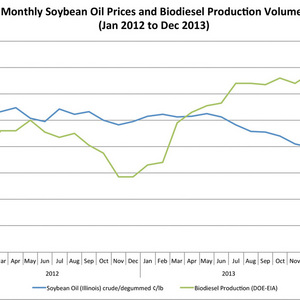Biodiesel Foundation: Investing in good science helps the industry



May 27, 2014
BY NBB
The National Biodiesel Foundation recently awarded a grant to the National Biodiesel Board to improve the science of greenhouse gas (GHG) modeling. Greenhouse gas reductions add to the economic and energy security benefits of biodiesel as an alternative to imported petroleum. Renewability and environmental benefits are something that fossil fuels simply can’t offer, so quantifying these benefits sets biodiesel apart from other alternatives in state and federal energy policies.
“The greatest potential for improving the accuracy of biodiesel’s GHG score is to improve the quantification of indirect land use change associated with feedstock production,” said Don Scott, director of sustainability at NBB. Under the NBF grant, NBB expects to improve the accuracy of data used in economic and life-cycle models. The biodiesel industry has set responsible goals based on the availability of feedstocks without increasing prices or acres.
Scott further explains, “The current theory of indirect land use change relies on the assumption that feedstock prices will increase, so the models are predicting outcomes nearly the opposite of what is actually happening.” In 2013, record biodiesel production demonstrated that feedstocks could remain in abundant supply. Biodiesel production increased 35 percent while soybean oil prices dropped 25 percent. “If the scientific community continues to improve the modeling, it is likely that model results will converge with reality and show zero indirect land use change emissions attributable to U.S. biodiesel,” Scott said.
Advertisement
NBF hopes to continue to support biodiesel research through projects such as the NBB grant to improve data inputs to GHG models. “NBF has shown a superior ability to manage the complex, technical projects required so that the science surrounding indirect land use change can be improved,” said NBF Vice President Beth Calabotta.
NBF encourages others to get involved as there is considerably more research to do. For more information about the foundation and its activities, or to show your support of its projects, visit www.BiodieselFoundation.org.
Advertisement
Related Stories
At the University of Missouri, plant biochemist Jay Thelen is using arabidopsis as a powerful model to explore ways to boost oil production — an important step toward creating more sustainable, plant-based energy sources.
Iowa farmers have a new market opportunity for their 2025 soybean crop. Landus is expanding its Clean Fuel Regulation initiative, made possible by recent policy changes expected to increase Canada's demand for liquid biofuel.
Total U.S. operable biofuels production capacity expanded in May, with gains for renewable diesel and a small decrease for ethanol, according to data released by the U.S. Energy Information Administration. Feedstock consumption was up.
The U.S Department of Energy Bioenergy Technologies Office, in partnership with the Algae Foundation and NREL, on July 21 announced the grand champion and top four winning teams of the 2023 - 2025 U.S. DOE AlgaePrize Competition.
The USDA significantly increased its estimate for 2025-’26 soybean oil use in biofuel production in its latest World Agricultural Supply and Demand Estimates report, released July 11. The outlook for soybean production was revised down.
Upcoming Events










